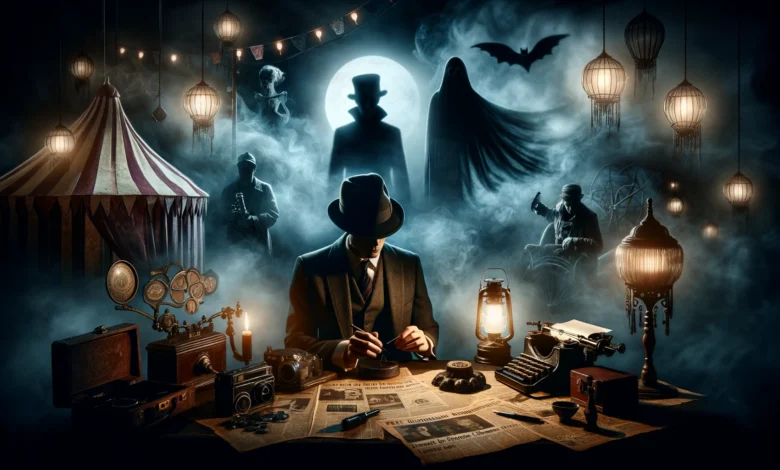The Psychology of Readers: Why We Love Ghost Stories

Introduction
Why do we love ghost stories? From ancient folklore to modern-day horror films, tales of spirits, hauntings, and the supernatural have captivated audiences for centuries. There’s something about the eerie chill of a well-told ghost story that keeps readers hooked. But why? Is it the thrill of being scared, the excitement of confronting the unknown, or something deeper in our psychology?
In this article, we’ll explore the psychological reasons behind our fascination with ghost stories and why they continue to haunt our imaginations.
What Are Ghost Stories?
Ghost stories, at their core, are narratives that center around the supernatural, particularly the spirits of the deceased. These stories often involve hauntings, unexplained phenomena, and encounters with the unknown. Traditionally passed down through folklore, ghost stories have been part of human culture for millennia, with every culture having its own variations and interpretations of what it means to encounter a ghost.
Ghost stories tap into one of humanity’s oldest fears the fear of death and the unknown—and provide a narrative that helps us explore these anxieties from a safe distance.
The Evolution of Ghost Stories
Ghost stories have come a long way from the cautionary tales of ancient myths and folklore. Early stories often involved spirits seeking vengeance or warning the living of impending doom. Over time, the portrayal of ghosts shifted. In literature, the Victorian era saw the rise of the ghost as a central figure in gothic fiction, with famous works such as ‘The Turn of the Screw” by Henry James and “A Christmas Carol” by Charles Dickens shaping how we think of spirits.
Modern ghost stories, whether in books or on film, have evolved to reflect contemporary fears, often blending psychological elements with traditional horror tropes.
Psychological Reasons Why We Love Ghost Stories
Ghost stories invoke a thrill of fear, stimulating our brain’s fight-or-flight response but in a controlled, safe environment. This release of adrenaline and endorphins gives us an enjoyable scare. Characters like the “little person fortune teller” in Paper Ghosts, who joins a journalist on a murder investigation, allow readers to encounter something otherworldly and mysterious while being completely immersed in a gripping narrative.
Additionally, these stories often involve mystery and puzzle-solving, adding layers of curiosity. The unknown, such as the unsolved crimes in Kalfel’s novel, resonates deeply with readers who love suspense and unpredictability.
The Role of Mystery in Ghost Stories
Part of what makes ghost stories so compelling is the element of mystery. Humans are naturally curious creatures, and ghost stories often involve solving puzzles or uncovering hidden truths. This sense of mystery keeps us engaged, urging us to read or watch further to understand the unknown.
Ghosts, by nature, represent the ultimate mystery the boundary between life and death. Our desire to explore this uncharted territory keeps us hooked, wanting to uncover what lies beyond.
Cultural Significance of Ghost Stories
Ghost stories are not just entertainment they often carry deep cultural significance. Different cultures interpret ghosts and the supernatural in unique ways. In many Asian cultures, for example, ghosts are believed to be tied to the moral balance of life, where spirits seek justice or retribution for wrongs done to them in life.
In the West, ghost stories are often intertwined with religious beliefs about the afterlife, purgatory, and unfinished business. These cultural lenses shape how ghost stories are told and how we, as readers, react to them.
Ghost Stories and the Fear of Death
At the heart of many ghost stories lies a fundamental human fear: death. Ghost stories allow us to explore the unknown world of the dead, often providing us with a narrative that helps us understand or at least come to terms with mortality.
In many ways, ghost stories are an exploration of what happens after death. Do we live on as spirits? Are we haunted by the past? These stories give us a safe space to engage with these questions, offering varying answers based on cultural and personal beliefs.
Symbolism and Catharsis
Ghost stories often symbolize more than just hauntings. In Paper Ghosts, the narrative explores deeper human themes like guilt, fear of mortality, and unresolved trauma. Ghosts, in these stories, become metaphors for what we leave unresolved in life, giving readers a chance to confront fears symbolically. The combination of supernatural elements and intricate storytelling, as seen in Jesse Kalfel’s work, keeps the audience engaged by blending fear with reflection.
The Social Aspect of Ghost Stories
Ghost stories have long been shared in communal settings—around campfires, at sleepovers, or during storytelling events. This social aspect amplifies their impact. The act of telling and listening to a ghost story together heightens the suspense, as the shared experience of fear and excitement brings people closer.
In modern times, ghost stories continue to thrive in social contexts through podcasts, films, and TV shows, where fans discuss and share their favorite stories.
The Science of Fear: Why It Feels Good to Be Scared
Why do ghost stories make us feel good, even though they scare us? The answer lies in the brain. When we’re scared, our body releases adrenaline and endorphins, triggering a fight-or-flight response. But because we know the threat isn’t real, we get the thrill without the risk. This combination of chemicals creates a pleasurable sensation, explaining why we return to ghost stories again and again.
Classic Ghost Stories in Literature
Some ghost stories have become classics, standing the test of time and continuing to captivate new generations of readers. Henry James’ “The Turn of the Screw” is a prime example, offering ambiguity and psychological complexity that leaves readers questioning what’s real. Other classics like “The Haunting of Hill House” by Shirley Jackson delve into the intersection of psychological fear and the supernatural, making these stories not just frightening, but deeply thought-provoking.
Ghost Stories in Popular Media
Ghost stories have found new life in modern media. From blockbuster films like “The Conjuring” to hit TV series like “The Haunting of Bly Manor,” ghost stories continue to adapt to the times. Podcasts like “Lore” and “Spooked” also bring ghost stories to new audiences, proving that our fascination with the supernatural is far from fading.
The Psychological Impact of Ghost Stories on Children
Children are naturally curious and imaginative, which makes ghost stories particularly appealing to them. However, their ability to process fear is still developing. Ghost stories can stimulate a child’s imagination, helping them understand the difference between reality and fantasy. In a controlled environment, ghost stories allow children to explore scary concepts in a way that feels manageable.
That said, it’s important to ensure that the level of fear is appropriate for their age. Overexposure to frightening content at a young age could lead to anxiety or nightmares. However, if handled carefully, ghost stories can help children develop emotional resilience by allowing them to experience fear and learn how to cope with it.
Why Ghost Stories Remain Popular Today
In a world dominated by rationality, science, and technology, ghost stories continue to captivate audiences. But why do tales of the supernatural still hold such power over us?
One reason is that ghost stories speak to our innate curiosity about the unknown. As much as we rely on logic and reason, the idea of an afterlife, spirits, or haunted places challenges our understanding of reality. Ghost stories offer a window into the mysterious and unexplainable, allowing us to explore questions that science has yet to answer.
In addition, modern anxieties and fears often find expression in ghost stories. For example, the fear of isolation or unresolved trauma can be embodied in a haunting, making the supernatural a metaphor for personal struggles. Ghost stories provide a way for people to work through these emotions in a context that feels both entertaining and meaningful.
Conclusion
Our fascination with ghost stories is deeply rooted in both our psychology and culture. They allow us to explore fear, death, and the unknown in a way that is thrilling but safe. Ghost stories speak to our desire to understand what lies beyond life, while also providing a platform for exploring unresolved emotions and social anxieties.
Whether it’s through literature, film, or oral storytelling, ghost stories continue to evolve while maintaining their timeless appeal. They reflect our collective fears and curiosities, and through their chilling narratives, offer us a way to confront the unknown from the comfort of our own imagination.





